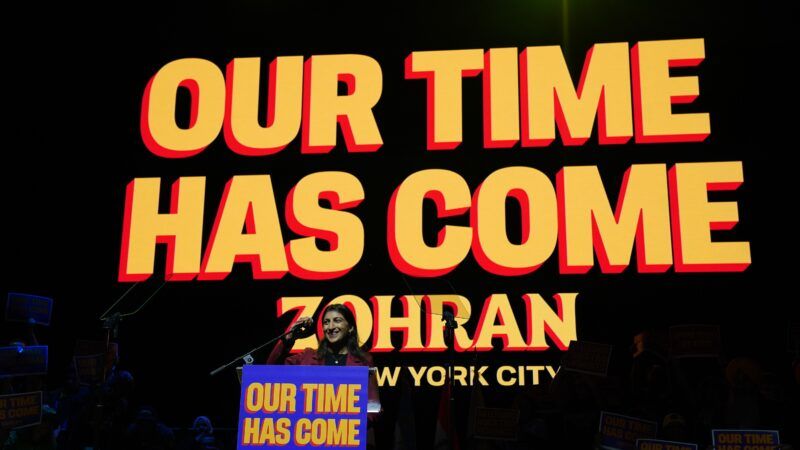Mamdani Teaming Up With Lina Khan Paints a Grim Picture of What's To Come
She's baaaaack...

Fresh off of trouncing competitors like former Gov. Andrew Cuomo and Curtis Sliwa in this week's election, future New York City mayor Zohran Mamdani has announced his transition team. One name stands out as an especially bad harbinger of how Mamdani's mayoral tenure might play out: Lina Khan.
Khan, who served as Federal Trade Commission (FTC) chair under Joe Biden, will be one of four cochairs of Mamdani's transition team.
"The poetry of campaigning may have come to a close last night at 9, but the beautiful prose of governing has only begun," said Mamdani yesterday. "The hard work of improving New Yorkers' lives starts now."
Of course, one transition team member isn't going to make or break whatever agenda Mamdani has planned. And there are reasons enough to worry about that agenda with or without Khan involved. For instance, during his victory speech, Mamdani—a democratic socialist—opined that there's "no problem too large for government to solve, and no concern too small for it to care about."
That's a disturbingly totalitarian view of the role of the state.
But when it comes to helping improve ordinary people's lives, Khan is hardly up for the job—not if history is any indication.
Before and during her tenure as FTC chair, Khan was known for her insistence that the role of antitrust law should not be upholding a consumer welfare standard—that is, a focus on how business activities and consolidation will affect prices and outcomes for consumers. Khan argued for abandoning the consumer welfare standard in favor of a more nebulous framework, one in which competition was good for its own sake and the government should intervene against big businesses to protect the position of their smaller competitors, whether or not it resulted in consumers getting a better deal.
She was known to oppose mergers and acquisitions based on the size of the company involved, notwithstanding whatever positive effects might accrue from that size. Like Tim Wu and other "neo-Brandeisian" antitrust theorists, Khan seemed to believe that bigger was always bad.
In practice, this resulted in her launching or continuing a number of ill-conceived or ill-fated actions against big tech companies, including a failed bid to block Microsoft from acquiring Activision Blizzard and a failed attempt to ban Meta from buying a virtual reality fitness app. Even when successful, the Khan FTC's antitrust suits seemed sort of silly, aimed at stopping minor inconveniences, like it taking six clicks to cancel Amazon Prime (which was fewer clicks than it took to submit a comment to the FTC about the lawsuit).
It would be one thing if Khan had big ideas about big changes meant to meaningfully improve people's lives, and libertarians simply disagreed with the wisdom of those ideas. But she had big ideas—involving lots of government mandates, meddling, and overreach—about achieving small changes that no one really wanted, or that failed to significantly impact or improve things for anyone.
She railed against the kind of tech integrations and innovations that surveys routinely show that consumers appreciate. She helped funnel big Biden administration talk about bringing fairness and competition back to the U.S. economy into rules covering the minutia of how hotel bills are displayed. She presided over anti-tech antitrust investigations, of which the only benefit seems to be securing government settlements.
Khan's time as FTC chair amounted to a lot of government time and activity attempting to micromanage markets with very little practical effect on people's lives.
Meanwhile, Khan tried to expand the FTC's regulatory authority beyond what was allowed and further erode the separation of powers. Despite Congress considering a bill to ban noncompete clauses, Khan's FTC enacted a ban itself. It was later struck down, with a judge declaring that the FTC lacked the authority to do this.
It's unclear whether Khan will eventually have a permanent role in Mamdani's mayoral administration or is simply a transitory advisor. But either way, her involvement doesn't bode well for anyone hoping that Mamdani will somehow be less overreaching than he seems or for anyone hoping that he'll succeed at anything majorly transformative. Khan's forte seems to be in turning radical-sounding ideas into absolutely mundane executions that still, somehow, flop.
